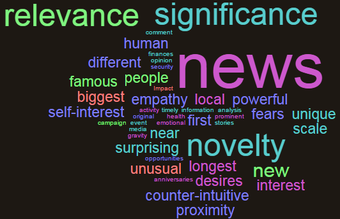
TV, radio, print and online news outlets still reach tens of thousands or even millions of people and, as much as they draw their news from social media, what they report also fuels and even sets the agenda for many online conversations.
The problem is that engaging journalists and their editors can be time-consuming and sometimes frustrating; so when is it worth making the effort?
As a journalist, I believe the simple answer is: when you have something novel, significant and relevant to offer them. By novel, I mean something that is timely and original; by significant I mean something that affects many people or a prominent individual; by relevant, I mean something that connects with the media’s audience because of proximity, self-interest or empathy.
Based on those three criteria, I’d like to suggest ten questions that might help your organisation decide if it’s worth offering a story to the news media.
Novelty
1. Can you offer something that will be counter-intuitive or surprising to the media’s audience?
Look at the story you are about to offer the media. Is there is anything surprising about it, or that breaks apart conventional wisdom? If there is, the story is the news media’s equivalent of gold dust.
2. Is there something unique about the event or activity you are publicising?
News organisations receive hundreds of emails and calls about meetings, events and campaigns. They will only be interested in yours, if there is something unusual about it or different from all the others. Think superlatives: biggest, longest, first…
3. Do you have new information or findings that the media’s audience does not already know about?
This is a fundamental question since, as the word implies, ‘news’ is something that is ‘new’. The media is only interested in things that have just happened, not things that happened yesterday or last week. Equally, if you have information, even if it’s about something that has already happened, it must be new or it won’t get covered.
4. Can you offer a unique or at least different analysis of existing information?
Apart from new information, the news media also welcomes fresh analysis or comment; especially if it conflicts with current interpretations. This is because news outlets look for things that push a story forward. Comments that simply repeat the opinion of others, or welcome their actions, are rarely covered.
Significance
5. Does your information, analysis or activity involve or seriously affect a lot of people?
This may be obvious to you but not necessarily to the media. So, make sure you include selected facts and figures in the information you offer to show the scale and gravity of the issue. Use context and superlatives to emphasise the impact of the problem or issue. (I.e. the largest, most serious, longest X in 10/20/50 years.) Equally, if you’re publicising a large event or campaign, be as specific as possible about numbers.
6. Does your information or activity affect or involve any prominent people?
Something is of interest to the media not just because of the number of people affected or involved but also because of who those people are. Having a prominent supporter, whether famous or powerful, willing to speak out about a concern will greatly increase media coverage of the issue.
Relevance
7. Does your issue affect or involve people who live among or near to the media’s audience?
Whether we like it or not, people are generally more concerned about things that happen near to them; hence the saying, ‘All news is local’. Even if your issue is global, it is always worth looking for, and highlighting, a local angle that will interest national or regional media.
8. Does your issue have implications for the wellbeing of the media’s audience?
The media will usually be interested, if you can show that your story has clear implications for the health, security or finances of its audience. Practical guidelines and tips that address this self interest are especially useful.
9. Can you connect the issue with the media’s audience on an emotional or psychological level?
We are all human and share many of the same fears, needs and desires. ‘Human interest’ stories about something extraordinary happening to an individual appeal to our empathy and are often highly newsworthy. You can encourage media coverage by offering quotes, photos and an opportunity to interview the person in question.
10. Does your activity, information or analysis concern something already in the news?
If it does, you know that the media has already judged the subject as relevant. So, monitor the news every day for unexpected opportunities to contribute your expertise and offer comment to the media quickly. Alternatively, look ahead for inevitable news stories like anniversaries and perennial events that you can link your story to.
These are the questions I tend to ask myself but what about you? Any comments or suggestions are most welcome!

 Canal RSS
Canal RSS
